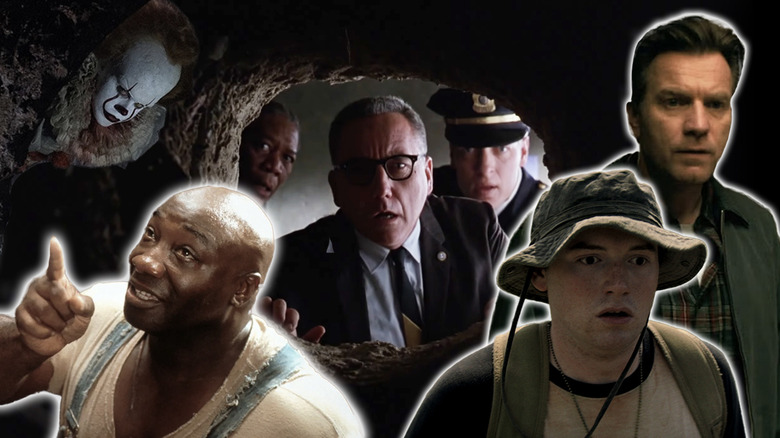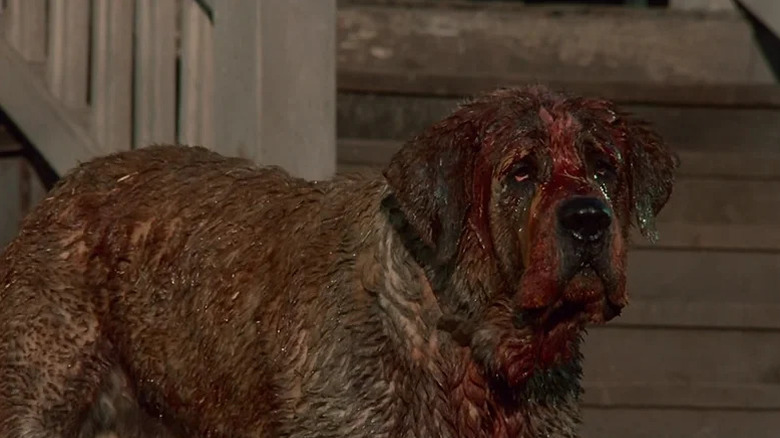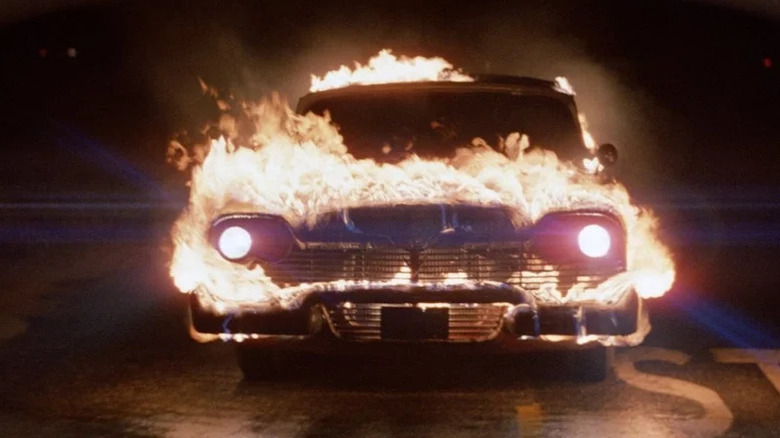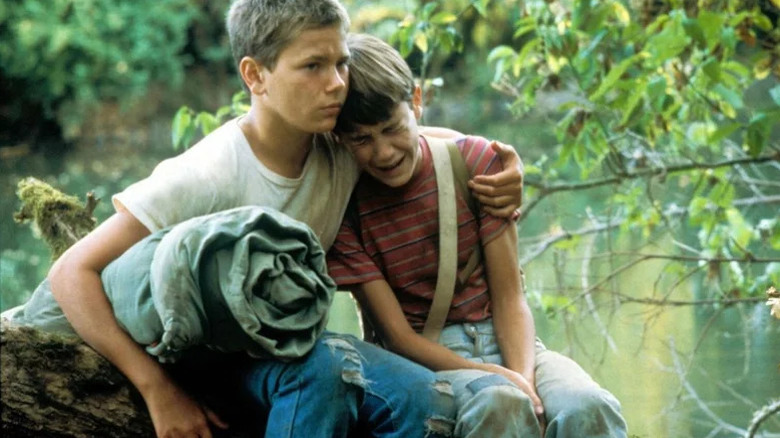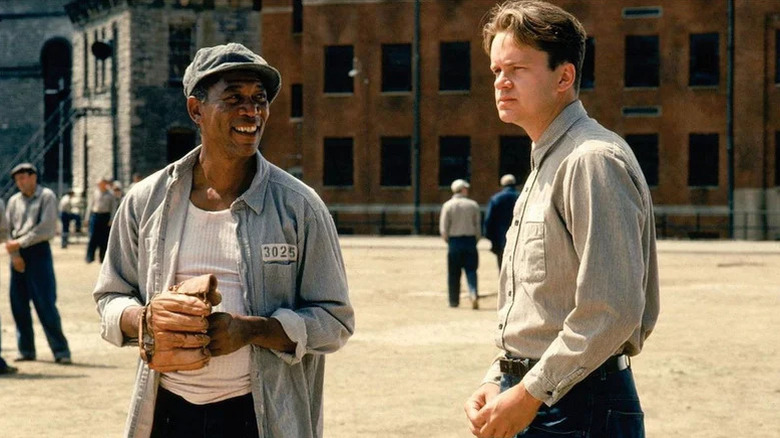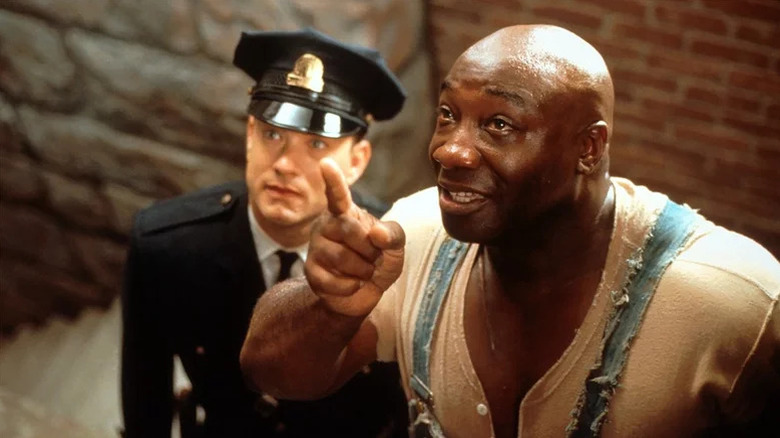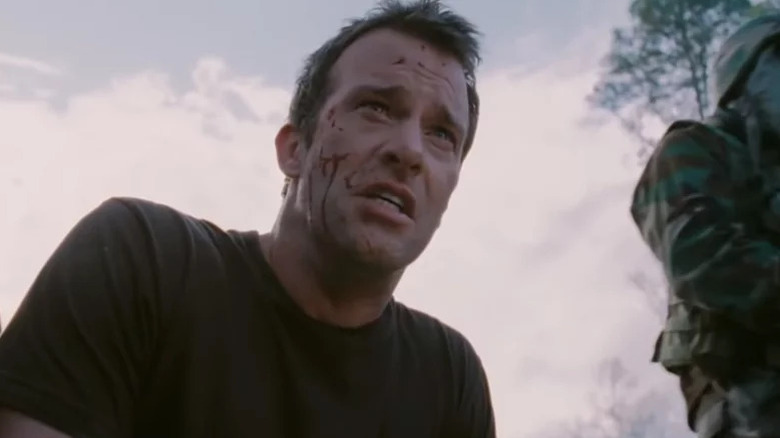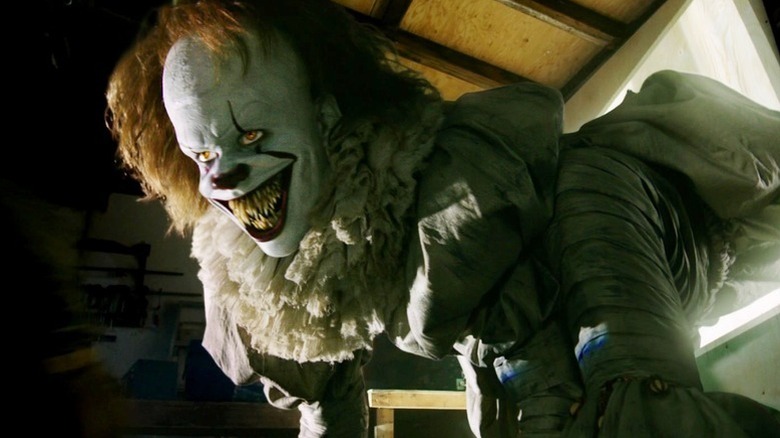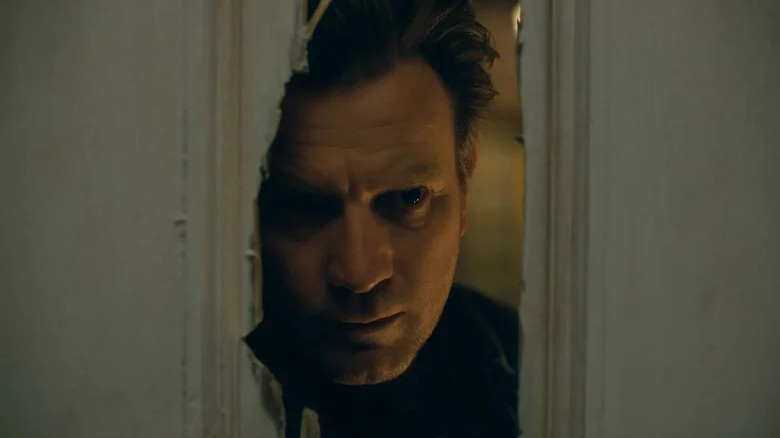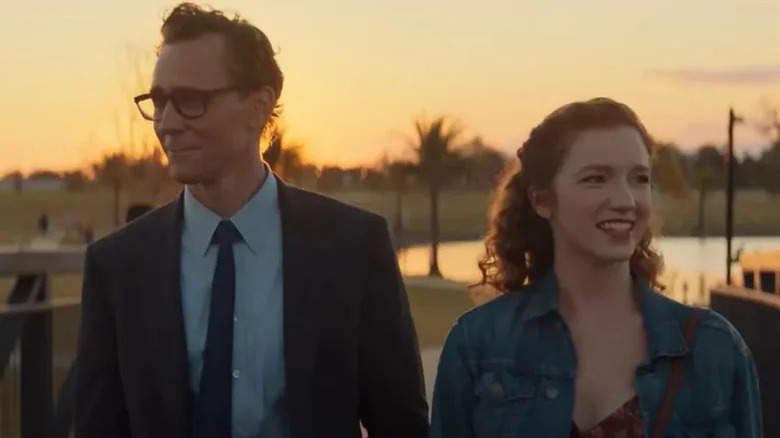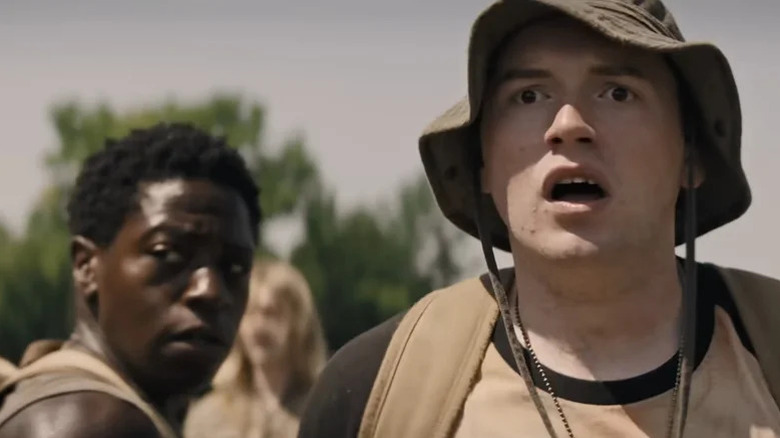10 Stephen King Movies That Are Better Than The Book
Don't get us wrong, we love Stephen King and his best-selling books, which have left an indelible mark that goes beyond mere pop culture. Whether it's King's fan-favorite short stories or his novels, the Maine-based author's work has influenced the horror genre, in particular, for decades. Dozens of King's works have been adapted into television and film projects ever since 1976's "Carrie," with varying levels of success. What can be said is that the vast majority of adaptations, as beloved or underrated as they've become, pale in comparison to King's original text.
But every now and again, a movie adaptation of King's work just gets the storytelling job done a bit better.
Whether it's productions with King's direct involvement or adaptations that just offered a cleaner presentation of the story on-screen, there are King movies that surpass the source material. To be clear, there are Stephen King books that you should read first, experiencing the story in its original form. But after that, compare them to these movies and see how the cinematic adaptations edged out the overall quality of the tale for the better. Here are 10 Stephen King movies that are better than the book that they're based on.
Cujo
It was a real dog attack that inspired Stephen King's "Cujo," with King basing the 1981 novel after facing a large, hostile Saint Bernard at a motorcycle repair shop. The novel was adapted into a movie in 1983, following the tale of a similarly massive Saint Bernard growing murderously aggressive after suffering a rabies infection. After mauling several people to death, Cujo besieges Donna Trenton (Dee Wallace) and her young son, Tad (Danny Pintauro), in her broken-down Ford Pinto. Without air conditioning and the heat becoming increasingly dangerous to a dehydrated Tad, Donna desperately looks for a way to fend off Cujo and save her son.
"Cujo" maintains the intensity and temperature-fueled claustrophobia of the novel, but where it excels is in its altered conclusion. Spoilers for both versions of the story, but the novel has Donna successfully kill Cujo, but fails to save Tad, who dies of heatstroke during the ensuing melee. "Cujo's" lead star demanded a different ending for the Stephen King adaptation, with Wallace's Donna taking the time to ensure her son survives after gravely injuring the rabid beast. King agreed with the change after seeing the finished film, confiding to Wallace that he received more hate mail over Tad's death than anything else he had written at the time.
Christine
1983's "Christine" saw influential horror filmmaker John Carpenter adapt King's novel of the same name, following a lethal 1958 Plymouth Fury with a mind of its own. After nerdy high schooler Arnie Cunningham (Keith Gordon) buys the Plymouth, it begins visibly transforming his personality, making him darker and more dangerous. Meanwhile, the car begins killing those whom it perceives as threatening its relationship with Arnie, including his new girlfriend, Leigh Cabot (Alexandra Paul). Trying to prevent Arnie from being completely corrupted by the car, Leigh works with his friend Dennis Guilder (John Stockwell) to destroy the malevolent automobile.
By his own admission, Stephen King struggled to finish the book that inspired "Christine," and that's apparent in the novel's ending. Carpenter's movie improves upon that, changing the convoluted nature of Arnie's literary demise and providing a much more satisfying and cohesive climax. For his part, John Carpenter couldn't care less about his Stephen King adaptation, but the 1983 film is a lot of straightforward fun. Though King was similarly dissatisfied with the movie, "Christine" understands its own assignment and gets the hotrod horror job done in style.
Stand By Me
The first non-horror or thriller adaptation of King's work was 1986's "Stand by Me," adapting King's 1982 novella "The Body." Primarily set in 1959, a group of adolescents led by Gordie Lachance (Wil Wheaton) and Chris Chambers (River Phoenix) venture to find a rumored body of a missing boy. Over this impromptu adventure, the boys' bond strengthens as they confront the local bullies and commiserate over the individual issues that they're facing. The entire story is part of the recollections of an adult Gordie (Richard Dreyfus), reflecting on Chris' death years later.
Though King has long drawn from his life and personal experiences for his stories, "The Boy" was a particularly autobiographical tale for him. With that in mind, Stephen King was pretty broken up after seeing "Stand by Me" for the first time, referring to it as the best adaptation of his work. Given the clearly genuine sense of heart and earnestness to the movie, it's easy to see why King was so emotionally affected by it, surpassing the source material's wistful qualities. More than just a stellar Stephen King adaptation improving upon the source material, "Stand by Me" remains the gold standard of coming-of-age movies.
The Shawshank Redemption
Another 1982 King novella that was adapted to widespread critical acclaim was "The Shawshank Redemption," based on "Rita Hayworth and Shawshank Redemption." The 1994 movie follows Andy Dufresne (Tim Robbins) after he's convicted of murdering his wife and her lover and sentenced to life in prison in the '40s. Over the ensuing 19 years, Dufresne befriends fellow inmate Red Redding (Morgan Freeman) while laundering money for the prison's corrupt and cruel warden, Samuel Norton (Bob Gunton). One morning, Norton and those in the prison are shocked to discover that Dufresne has vanished overnight in a brazen escape.
Though "The Shawshank Redemption" was a box office disappointment in its initial theatrical release, it has become one of the most universally celebrated King adaptations. Filmmaker Frank Darabont turns the 128-page story into a sprawling prison saga covering Dufresne's lengthy time behind bars and the ordeal that he endures. Darabont also takes the time to further develop the story's ensemble cast, creating a full-on tragedy affecting many of Dufresne's compatriots. One King's two favorite movie adaptations of his books, "The Shawshank Redemption" expands the story to epic proportions.
The Green Mile
Five years after making "The Shawshank Redemption," Frank Darabont adapted another one of King's period piece prison tales, "The Green Mile." Set in 1935, the 1999 movie has corrections officer Paul Edgecomb (Tom Hanks) oversee the death row of a Louisiana prison. Among the inmates that Edgecomb has during this period is John Coffey (Michael Clarke Duncan), a large Black man convicted of murdering two Caucasian girls. As Coffey reveals miraculously supernatural healing and empathic powers to the guards, Edgecomb begins to doubt his guilt in the murder conviction.
Often overshadowed by "The Shawshank Redemption," "The Green Mile" is Frank Darabont's underappreciated gem, even after its rightfully earned critical and commercial success. Like his other King adaptations, Darabont really hones in on the character relationships, not just between Edgecomb and Coffey, but the other guards and inmates around them. That makes the movie's standout heartbreaking moments hit all that much harder, really driving the harrowing emotional stakes even as they're clearly telegraphed. One of the best feel-bad movies you need to watch, "The Green Mile" leans hard into tragedy over triumph in this haunting prison story.
The Mist
There are two filmmakers who understand King's text intuitively when adapting it, and one of them is Frank Darabont. Darabont's last King adaptation to date is 2007's "The Mist," adapting King's 1980 novella of the same name, depicting a small Maine town engulfed in a mysterious fog. Within the mist are monstrous creatures that brutally kill anyone they come into contact with, prompting a group of locals to shelter in the town's supermarket. As the group descends into tense hysteria, David Drayton (Thomas Jane) tries to find a way to escape to safety with his young son, Billy (Nathan Gamble).
Throughout his numerous projects, "The Mist" is Frank Darabont's most gut-wrenching Stephen King adaptation, more from the actions of its characters than its monsters. Marcia Gay Harden gives the most vile performance of her career as a religious zealot who convinces the crowd that the mist is divine punishment and requires human sacrifice. This all culminates in an ending that even Stephen King was a little envious of in how it deviated from his original story. If Frank Darabont unfortunately doesn't adapt any more of Stephen King's work, at least "The Mist" ends his winning streak on a vicious high note.
It
Look, "It" is a stone-cold classic, but it's also one of King's longest novels, clocking in at over 1,100 pages, with its official unabridged audiobook nearly 45 hours long. The story unfolds across two periods in Derry, Maine, starting with a group of children banding together to confront It (Bill Skarsgård), a shape-shifting monster that primarily preys on kids. After defeating the terrifying entity, the gang reunites 27 years later as adults when they learn that It has survived to claim fresh victims. In an effort to unnerve and divide them, It plays on the friends' greatest fears while enlisting unwitting human familiars to attack the opposition.
What the 2017 "It" adaptation and — to an admittedly lesser extent — its 2019 sequel accomplish is providing a streamlined take on the story. The more world-building elements from King's text are excised or merely alluded to, keeping the focus tight on the friendship between its main characters. Also, thankfully removed is the controversial child sex scene from the book which will hopefully never be adapted. And for those missing the expansive backstory King wrote for "It," the spin-off series "It: Welcome to Derry" brings surprisingly gruesome scares while exploring the town's history.
Doctor Sleep
The other major filmmaker who's consistently done Stephen King's work justice in multiple cinematic adaptations is Mike Flanagan. Flanagan's second King adaptation was 2019's "Doctor Sleep," the sequel to "The Shining," a novel that King wrote as a challenge to himself. The story follows an adult Danny Torrance (Ewan McGregor), who is haunted by ghosts from the Overlook Hotel and his troubled psychic abilities. After Danny learns of a sinister cult that preys on psychic children targeting Danny's friend Abra Stone (Kyliegh Curran), he and Abra take a stand to defeat the energy vampires.
Flanagan dispenses some of the novel's more head-scratching plot points, including that Abra is Danny's half-sister, while heightening the scares and violence. This culminates in a showdown at the abandoned Overlook Hotel, reconciling the conflicting views of Stanley Kubrick and King over Kubrick's adaptation of "The Shining." In doing so, Flanagan improves upon the story's final act, giving Danny a heroic send-off while atmospherically channeling the creepier elements of Kubrick's 1980 classic. Flanagan somehow pulled off the impossible with "Doctor Sleep," crafting a worthy sequel to a previous adaptation King vocally detested while faithfully recreating King's follow-up.
The Life of Chuck
Mike Flanagan's third Stephen King adaptation, 2024's "The Life of Chuck," is a complete tonal opposite from his past work, bringing the author's text to the silver screen. Like the 2020 novella, the story unfolds in reverse chronological order, starting with the final moments of unassuming accountant Chuck Krantz (Tom Hiddleston), whose death ends the universe with him. This leads to earlier vignettes in Chuck's life, from discovering his love of dancing as a child to a sublimely spontaneous moment months before his death. Along the way, Chuck learns the meaning of life and his own place in the world as he embraces its joyous moments.
"The Life of Chuck" is Flanagan's most sentimental film to date, capturing the surprisingly sweet qualities of a story that ends with the universe ending. The movie is arguably Flanagan's most faithful adaptation of King's work, emphasizing several supporting characters and upping the movie's magical whimsy. This is led by Flanagan assembling his best ensemble cast, with Hiddleston front and center as the story's optimistic title character. Mike Flanagan's empathetic opus, "The Life of Chuck" only enhances King's source material in its cinematic retelling.
The Long Walk
2025 has been a good year for Stephen King fans, with numerous enjoyable adaptations of his work on film and television. This extends to the dystopian thriller "The Long Walk," based on the 1979 novel that King wrote under the pseudonym Richard Bachman. Set in a totalitarian United States, the story revolves around an annual contest where a teenage boy from each state must constantly walk under close armed escort. Boys who fall below a certain speed or stop are executed after they receive three warnings, with the last participant standing crowned the winner.
"The Long Walk" stays largely faithful to King's text but, like Darabont's best King adaptations, improves upon it by focusing tightly on character development. This makes every character's death, once the cross-country march kicks into high gear, all the more heartbreaking as it unfolds. Grounding the whole adaptation are the lead performances from Cooper Hoffman and David Jonsson, playing participants Ray Garraty and Pete McVries, respectively, who form a tragic friendship during the competition. An emotionally obliterating all-time great Stephen King adaptation, "The Long Walk" does the source material justice while underscoring the grueling nature of its premise.
